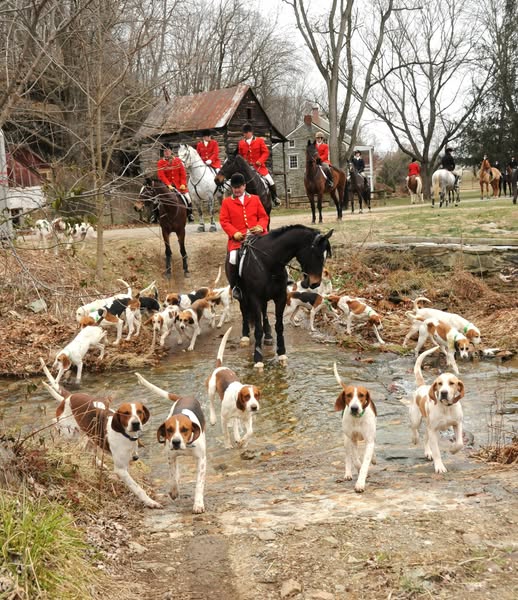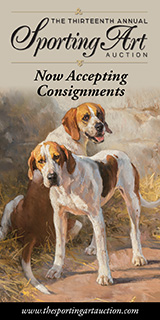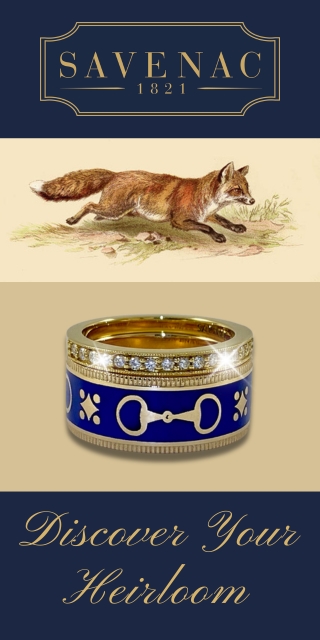Goshen Hounds
Robert’s Irish Yoga Tour
To celebrate Robert Taylor, MFH and Huntsman, 30 years with Goshen Hounds, Kelly Wengerd and others took a southern tour of hunt clubs this spring. Irish Yoga may have been involved as well.
Read More
Liam Clancy: Foxhunter, Artist
“Elegance.” Maureen Conroy Britell out with the Piedmont Fox Hounds (VA). Acrylic paint on textured acrylic paper.
Irish artist Liam Clancy made a fast tour of the Virginia and Maryland hunting countries during the first week of March 2020—just before the world stopped in its tracks as the result of COVID. He got in some hunting, both mounted and on foot, and he gathered material for his work—painting commissions.
Liam works mostly in acrylic paint, which he likes for its versatility. “I can dash off something that looks like a watercolor, or build up a painting in layers as you would with oils,” he explains.
Huntsmen On the Move: 2019
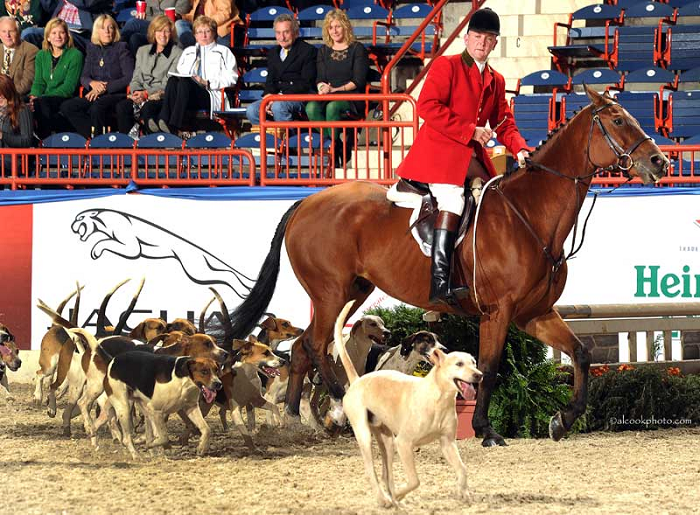 Huntsman Steve Farrin, parading Amwell Valley hounds at the Pennsylvania National Horse Show (2013).
Huntsman Steve Farrin, parading Amwell Valley hounds at the Pennsylvania National Horse Show (2013).
It’s time for our annual report on the recent moves of huntsmen across North America. The huntsman is my hero. From the time we mount up and for the few hours that follow, it is he or she most directly responsible for the day’s sport. How the huntsman has bred, trained, deployed, and communicated with his troops—the hounds—has everything to do with the satisfaction of our day in the field.
The moves have been numerous this season, and, in a two cases, we have experienced whippers-in finally achieving their dream of a pack of their own to hunt. We’ll catch up with Alasdair Storer, Andrew Bozdan, Kathryn Butler, Stephen Farrin, Danny Kerr, Emily Melton, and Timothy Michel.
Bedford County Detroit Is Grand Champion at Carolinas
Grand Champion of Show, Bedford County Detroit 2017 with handler Laura Pitts.The 2019 Carolinas Hound Show was hosted by the Moore County Hounds on May 11th at Lyell’s Meadow in the Walthour Moss Foundation, a paradise for horsemen and naturalists in the sand hills of Southern Pines, NC. The Foundation was formed in 1974 by Pappy and Ginny Moss, MFHs of the Moore County Hounds (NC), as a charitable trust of 1,700 acres preserved in perpetuity. With additional gifts through the succeeding years from Ginny Moss and others, the Foundation now totals more than 4,000 acres and represents Moore County’s principal hunting country.
Hounds competed in three rings, Crossbred in Ring 1, Penn-Marydel in Ring 2, and English, American, and Foot packs in Ring 3. That one ring is dedicated entirely to Penn-Marydel hounds, and English and American foxhounds are combined in one ring with foot hounds, strikes this reporter as a noteworthy indication of the growing affinity for Penn-Marydel foxhounds amongst North American hunts well outside of the breed’s native region of Pennsylvania, Maryland, and Delaware. Concomitantly, the consequence must be a reduction in the numbers of Pure English and American types now being hunted in these southern Atlantic states.
In Strange New Territory
Liz Callar photoIt is hard to believe now, but at the start of the 2017 hunting season I was actually lamenting the difficulties of leaving a hunt I had been with for fifteen years and joining another. Even at the time, I realized it was a small issue in the scheme of things that can happen in life. Making new friends and riding across some breathtaking new country quickly proved to me that I had made the right decision.
That season started out well. I was hunting regularly, and in October, Karen and I traveled with the Last Chance Hounds to the Moore County Hounds Hark Forward Foxhound Performance Trials in North Carolina. By January, however, hunting was the last thing on my mind. And I never did get out after that.
Preparation’s a Pain; Hunting’s a Hoot
Lori and OzzyIt took forty minutes in the pea soup fog early this morning to bring the horses in. Something about the early morning darkness convinces them they are feral. Although with Ozzy’s skin he would last about two minutes in the wild. Not to mention his feet....
Horses are apparently unable to connect the sight of human figures in the dark with the same people they see at least twice a day 365 days a year. This mental dilemma triggered an extended episode of BAF.*
Last night, also in the dark, found me in the backyard manning the grill. I was making dry-rubbed drumsticks for the tailgate, following Roger Mooking’s recipe, whoever he is.** My original plan was to grill them in the morning, and then I came to my senses. Also baked some S'mores cupcakes. I did not have a cupcake tin so I just filled the paper cups and crammed them tightly into a baking pan. My hope was that maybe squeezing them together would give them more support and shape. They exited the oven shaped like amoebas but luckily they tasted better than they looked. Hubby liked them but was suspicious and wanted to know “what is the brown stuff on the bottom?” That would be Graham Crackers, Rick. As a Boy Scout, Rick went home with a headache before his first overnight. Obviously before the campfire was even lit. The chicken looked just like the photo in the magazine.
Junior Field Hunter Championships: More Than a Competition
Heather Feconda, Loudoun-Fairfax Hunt (VA), was Champion, 13 & Over, on Yogi. / Richard Clay photo
The Junior North American Field Hunter Championship competition that began modestly twelve years ago between a handful of geographically-close Virginia hunts continues to expand in scope. This year’s competition involved juniors from twenty-seven hunts located across six MFHA Districts.
The program is succeeding because it’s purpose rises above just competition. Founders Douglas Wise, MFH, Old Dominion Hounds and Iona Pillion from the Blue Ridge Hunt had a larger dream: bring children to new hunting countries and open their eyes to the fact that these playgrounds don’t just happen to be there for them by chance, but have been nurtured and conserved for the perpetuation of wildlife, open space, and for those who treasure the natural world.
“We want these kids to know what a conservation easement is,” said Marion Chungo, one of the organizers.
Huntsmen on the Move
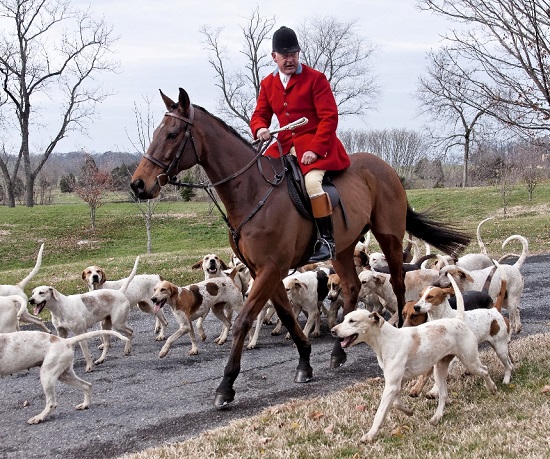 Dennis Downing is the new huntsman at the Bedford Hunt (VA). / Karen L. Myers photo
Dennis Downing is the new huntsman at the Bedford Hunt (VA). / Karen L. Myers photo
Huntsman Robert Taylor hasn’t had a good rest in five years. He’s been hunting two separate packs of foxhounds in Maryland—the Goshen Hounds as Master and amateur huntsman and the New Market-Middletown Valley Hounds as professional huntsman. Huntsman Ken George has been driving hounds and horses six hours each way twice a week from Kansas to Iowa to hunt hounds in both states. Huntsmen love what they do, but each season ends with changes in the wind.
As this hunting season draws to a close, we see huntsmen on the move again. Starting in the north and progressing southward then west, here’s what we know so far; please let us know who we’ve left out.
Goshen Hounds Take a New Year’s Swim
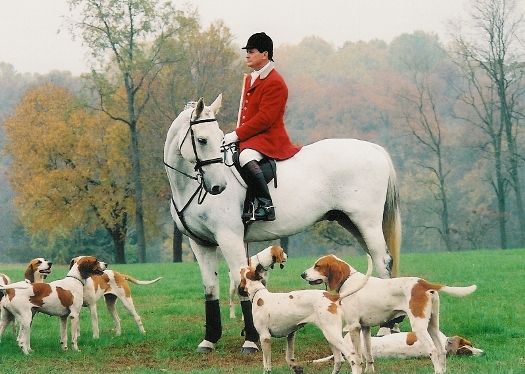 Robert Taylor, MFH and huntsman of the Goshen Hounds, had a memorable hunt with hounds on New Year's Day.
Robert Taylor, MFH and huntsman of the Goshen Hounds, had a memorable hunt with hounds on New Year's Day.
Some days you simply wonder what the gods are thinking. Today, New Year’s Day, was a day that I simply could not hunt because of social obligations unrelated to the hunting world. No amount of explaining and squirming would have been adequate to allow me to meet with the Goshen Hounds (MD) today. Consequently, it was with some delight when I was finally able to quietly announce at about 2:00 pm that I thought I would "visit the kennels" for a short while.
When I arrived it was apparent the hounds were still in the field, so I drove to the usual draw down Middleton Lane and was greeted with the distant view of a whipper-in and the cheering of huntsman and Joint-Master Robert Taylor. I knew exactly where they were, but getting to them in my trusty Tahoe was a different matter. Undaunted, I proceeded on (in four wheel drive), but still could not quite make contact.
Several riders were coming in with tales of, "Wow! What a run! My horse is cooked!" In desperation, I gave up and headed to the kennels. Soon I was greeted with the sight of Robert and hounds coming in, and, oh, what tales they had to tell.
Bay Cockburn, ex-MFH, Race Rider, Huntsman
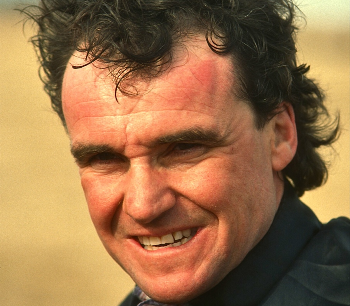 Douglas Lees photoBay Cockburn, ex-MFH, hard-riding huntsman, and former winning steeplechase jockey and trainer, died of complications from melanoma on December 25, 2013.
Douglas Lees photoBay Cockburn, ex-MFH, hard-riding huntsman, and former winning steeplechase jockey and trainer, died of complications from melanoma on December 25, 2013.
Confined to a wheelchair for the last fifteen years of his life as the result of a riding accident, Bay was an aggressive race rider and had been referred to as the Evel Knievel of all huntsmen. He represented the epitome of invincibility in the saddle until one fateful day, while exercising a hunter over a straightforward coop that he had jumped countless times, he fell and was left paralyzed from the chest down.
He stayed in the game as best he could, training steeplechase horses, and despite the wheelchair, he continued to live the only way he knew how: full speed forward. I saw him at the races one day propelling his motorized chair, rocking perilously over the lumpy ground across a hillside until it finally toppled over. Friends rushed to right him and rearrange him in his chair, and he continued his hurried progress to get a glimpse of his horse at the next fence. Just another of many falls to ignore. Bay maintained his training license and remained active through 2013.
Bay rode in sanctioned races and point-to-points from 1991 to 1997 with twelve sanctioned wins to his credit. I saw him steal a race down the stretch at the Blue Ridge Hunt Point-to-Point one year. He was lying second trying to overtake the leader. He anticipated just when the jock in first place would turn around to check on him. His body went quiet as if he had resigned himself to second place. The jock in front checked on Bay, was satisfied he had the race won, turned back to the wire and went to sleep. Bay got into his horse like a whirling dervish and passed his victim just before the wire.


